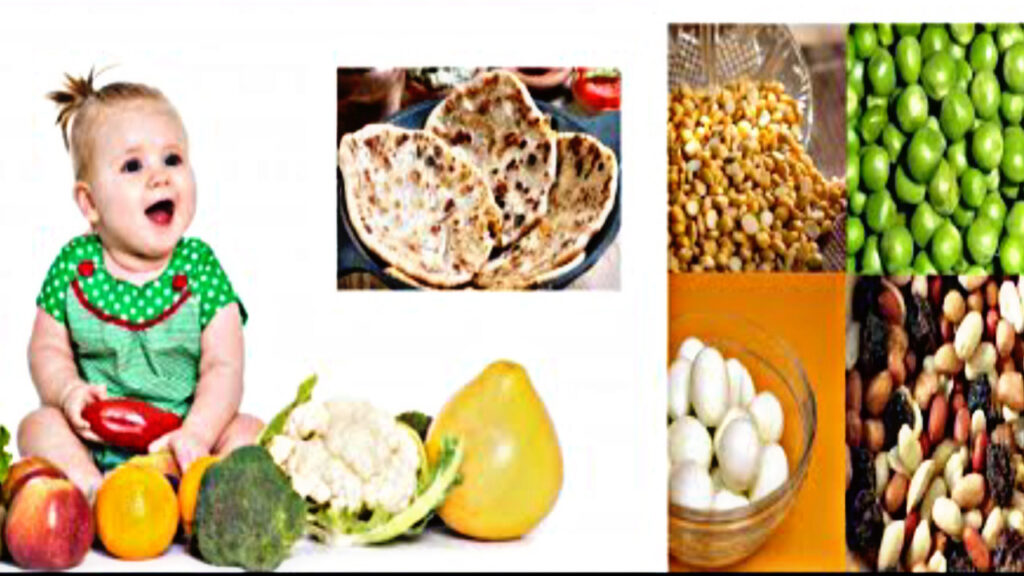Health
When it comes to feeding your child, ensuring they get the right balance of nutrients is essential for their growth, development, and overall health. A child’s diet should be rich in a variety of foods that support their energy levels, immunity, and cognitive function. Below are some key food groups that should be included in a child’s diet to keep them healthy and strong.

1. Fruits and Vegetables: A Must-Have for Vitamins and Minerals
Fruits and vegetables are packed with essential vitamins, minerals, and fiber. These nutrients play a key role in boosting immunity, maintaining healthy skin, and supporting growth. Incorporating a variety of colorful fruits and vegetables is a great way to ensure your child gets the broad spectrum of nutrients they need.
- Examples: Apples, bananas, oranges, berries, carrots, spinach, broccoli, and bell peppers.
- Benefits: Rich in Vitamin C, A, and fiber, which help in boosting immunity, improving eyesight, and aiding digestion.
2. Whole Grains: The Best Source of Energy

Whole grains are an excellent source of complex carbohydrates, which provide a steady supply of energy throughout the day. Unlike refined grains, whole grains contain more fiber, vitamins, and minerals, making them a healthier choice for growing children.
- Examples: Oats, brown rice, quinoa, whole wheat bread, and whole grain pasta.
- Benefits: Helps in maintaining energy levels, stabilizing blood sugar, and improving digestive health.
3. Protein-Rich Foods: Fuel for Growth and Development

Protein is vital for the growth and repair of tissues, the production of enzymes and hormones, and overall muscle development. Children need an adequate amount of protein for healthy physical and mental development.
- Examples: Chicken, fish, eggs, beans, lentils, tofu, and dairy products.
- Benefits: Supports muscle growth, enhances brain function, and helps in tissue repair.
4. Healthy Fats: Good for Brain Function and Heart Health

Healthy fats are crucial for your child’s brain development, cognitive abilities, and overall well-being. These fats also help in the absorption of fat-soluble vitamins like A, D, E, and K, which are necessary for growth.
- Examples: Avocados, nuts (like almonds and walnuts), seeds (flaxseeds, chia seeds), olive oil, and fatty fish (salmon, mackerel).
- Benefits: Promotes healthy brain function, supports heart health, and aids in the absorption of nutrients.
5. Dairy Products: For Strong Bones and Teeth

Dairy products are a rich source of calcium, a mineral essential for developing strong bones and teeth. They also contain other vital nutrients like protein and Vitamin D that help in overall growth and immunity.
- Examples: Milk, yogurt, cheese, and fortified plant-based alternatives like almond milk.
- Benefits: Helps in building strong bones, improving bone density, and maintaining dental health.
6. Hydration: Water as the Foundation of Health

Proper hydration is essential for a child’s health, as water helps in digestion, nutrient absorption, and maintaining body temperature. Encouraging children to drink plenty of water throughout the day can prevent dehydration and support overall bodily functions.
- Examples: Water, fresh fruit juices (in moderation), coconut water.
- Benefits: Maintains hydration, aids in digestion, and supports kidney function.
A balanced diet is the key to ensuring your child receives all the essential nutrients needed for growth, development, and overall health. Including a variety of fruits, vegetables, whole grains, protein sources, healthy fats, and dairy in your child’s daily meals will help them stay energized, strong, and healthy. Additionally, encourage them to drink plenty of water and enjoy a variety of foods to keep their taste buds engaged while fueling their bodies with what they need.
By following these simple dietary guidelines, you can help your child establish healthy eating habits that will last a lifetime.





